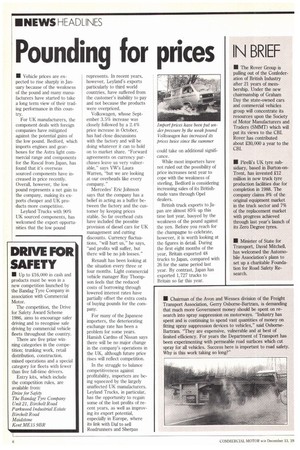Pounding for prices
Page 8

If you've noticed an error in this article please click here to report it so we can fix it.
• Vehicle prices are expected to rise sharply in January because of the weakness of the pound and many manufacturers have started to take a long term view of their trading performance in this country.
For UK manufacturers, the component deals with foreign companies have mitigated against the potential gains of the low pound. Bedford, which imports engines and gearboxes for the Astra light commercial range and components for the Rascal from Japan, has found that it's overseas sourced components have increased in price recently. Overall, however, the low pound represents a net gain to the company, making its exports cheaper and UK products more competitive.
Leyland Trucks with 90% UK sourced components, has welcomed the export opportunities that the low pound represents. In recent years, however, Leyland's exports particularly to third world countries, have suffered from the customer's inability to pay and not because the products were overpriced.
Volkswagen, whose September 3.5% increase was closely followed by a 2.4% price increase in October, has had close discussions with the factory and will be doing whatever it can to hold on to market share. "Forward agreements on currency purchases leave us very vulnerable," says VW's Laura Warren, "but we are looking at our overheads like every company."
Mercedes' Eric Johnson says that the company has a belief in acting as a buffer between the factory and the customer by keeping prices stable. So far overhead cuts have included the possible provision of diesel cars for UK management and cutting discounts. Currency fluctuations, "will hurt us," he says, "and profits will suffer, but there will be no job losses."
Renault has been looking at the situation every three or four months. Light commercial vehicle manager Ray Thompson feels that the reduced costs of borrowing through lowered interest rates have partially offset the extra costs of buying pounds for the company.
For many of the Japanese importers, the deteriorating exchange rate has been a problem for some years. Harnish Cardno of Nissan says there will be no major change in the company's operations in the UK, although future price rises will reflect competition.
In the struggle to balance competitiveness against profitability, importers are being squeezed by the largely unaffected UK manufacturers. Leyland Trucks, in particular, has the opportunity to regain some of the lost profits of recent years, as well as improving its export potential, especially in Europe, where its link with Daf to sell Roadrunners and Sherpas could take on additional significance.
While most importers have not ruled out the possibility of price increases next year to cope with the weakness of sterling, Bedford is considering increasing sales of its Britishmade vans through Opel dealers.
British truck exports to Japan are almost 85% up this time last year, buoyed by the weakness of the pound against the yen. Before you reach for the champagne to celebrate, however, it is worth looking at the figures in detail. During the first eight months of the year, Britain exported 48 trucks to Japan, compared with 26 for the same period last year. By contrast, Japan has exported 1,727 trucks to Britain so far this year.












































































